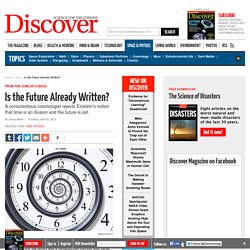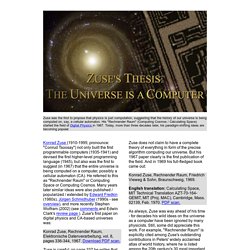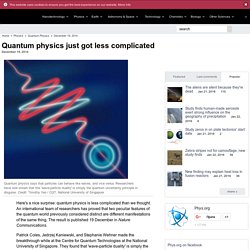

Jizba 2011 J. Phys.%3A Conf. Ser. 306 012026. Is the Future Already Written? Time off from Time Even though Ellis had reservations about time and the block universe, he still admired Einstein, and his respect deepened when he moved to Cambridge in 1960 to pursue a doctorate degree with world-renowned cosmologist Dennis Sciama.

During his early years as a researcher, Ellis earned a reputation as a world-class cosmologist for his ability to tackle the tricky mathematics needed to fully solve some of Einstein’s space-time equations. Ellis respected Einstein’s mathematical ingenuity, but he later balked at the philosophical implications of the block universe, in which the future stands on the same footing as the past. “If we are just machines living out a future that has already been set, then Adolf Hitler had no choice to do other than what he did; Hendrik Verwoerd, the architect of apartheid, had no choice,” Ellis says. It would be meaningless to tell them they were doing something wrong, he adds. Can Quantum Computing Reveal the True Meaning of Quantum Mechanics? - The Nature of Reality — The Nature of Reality. Quantum mechanics says not merely that the world is probabilistic, but that it uses rules of probability that no science fiction writer would have had the imagination to invent.

These rules involve complex numbers, called “amplitudes,” rather than just probabilities (which are real numbers between 0 and 1). As long as a physical object isn’t interacting with anything else, its state is a huge wave of these amplitudes, one for every configuration that the system could be found in upon measuring it. Left to itself, the wave of amplitudes evolves in a linear, deterministic way. But when you measure the object, you see some definite configuration, with a probability equal to the squared absolute value of its amplitude. The interaction with the measuring device “collapses” the object to whichever configuration you saw. Could quantum computing help reveal what the laws of quantum mechanics really mean? At one level, the answer seems like an obvious “no.” But it gets worse.
Shor's algorithm. Shor's algorithm, named after mathematician Peter Shor, is a quantum algorithm (an algorithm that runs on a quantum computer) for integer factorization formulated in 1994.

Informally it solves the following problem: Given an integer N, find its prime factors. On a quantum computer, to factor an integer N, Shor's algorithm runs in polynomial time (the time taken is polynomial in log N, which is the size of the input).[1] Specifically it takes time and quantum gates of order O((log N)2(log log N)(log log log N)) using fast multiplication,[2] demonstrating that the integer factorization problem can be efficiently solved on a quantum computer and is thus in the complexity class BQP. Procedure[edit] The problem we are trying to solve is: given an odd composite number , find an integer , strictly between and , that divides . Because any even value of. Zuse's Thesis - Zuse hypothesis - Algorithmic Theory of Everything - Digital Physics, Rechnender Raum (Computing Space, Computing Cosmos) - Computable Universe - The Universe is a Computer - Theory of Everything. Konrad Zuse (1910-1995; pronounce: "Conrud Tsoosay") not only built the first programmable computers (1935-1941) and devised the first higher-level programming language (1945), but also was the first to suggest (in 1967) that the entire universe is being computed on a computer, possibly a cellular automaton (CA).

He referred to this as "Rechnender Raum" or Computing Space or Computing Cosmos. Many years later similar ideas were also published / popularized / extended by Edward Fredkin (1980s), Jürgen Schmidhuber (1990s - see overview), and more recently Stephen Wolfram (2002) (see comments and Edwin Clark's review page ). Zuse's first paper on digital physics and CA-based universes was: Zuse is careful: on page 337 he writes that at the moment we do not have full digital models of physics, but that does not prevent him from asking right there: which would be the consequences of a total discretization of all natural laws?
Quantum physics just got less complicated. Here's a nice surprise: quantum physics is less complicated than we thought.

An international team of researchers has proved that two peculiar features of the quantum world previously considered distinct are different manifestations of the same thing. The result is published 19 December in Nature Communications. Patrick Coles, Jedrzej Kaniewski, and Stephanie Wehner made the breakthrough while at the Centre for Quantum Technologies at the National University of Singapore. They found that 'wave-particle duality' is simply the quantum 'uncertainty principle' in disguise, reducing two mysteries to one. "The connection between uncertainty and wave-particle duality comes out very naturally when you consider them as questions about what information you can gain about a system.
The discovery deepens our understanding of quantum physics and could prompt ideas for new applications of wave-particle duality. Explore further: A new 'lens' for looking at quantum behavior.
John L. Haller.